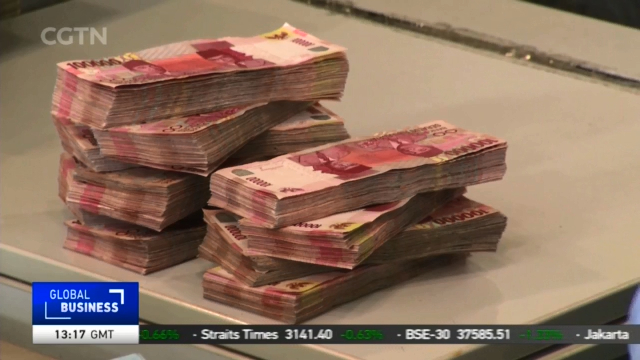
21:48, 17-Sep-2018
Emerging Market Woes: Indonesia sees worst currency decline in two decades
Updated
21:47, 20-Sep-2018
03:31

Turning to Indonesia. The Indonesian rupiah is experiencing a slump that hasn't been seen in the past 20 years. The decline came as emerging markets' currencies, including the rupiah, are feeling the squeeze of tightening monetary policies and ongoing global trade tensions. CGTN's Silkina Ahluwalia has more from Jakarta.
In early August of this year, Turkey's Lira plunged to a record low against the US Dollar, affecting local stocks and bonds. Now experts are saying that might have triggered a rout in other developing economies such as Indonesia. The country's currency fell to its lowest rate in September since two decades ago. It's also coming at a time when emerging markets are adjusting to rising interest rates by the United States.
JOSUA PARDEDE ECONOMIST "The tighter monetary policy in the U.S have affected emerging markets particularly in Asian markets because we know that global investors fly to quality which is again back to US market or European market and it makes some markets in emerging countries negatively affected by tighter US monetary policy."
Emerging markets have always been vulnerable to crisis. The trade tensions between the United States and China are only making things worse. Economies like Indonesia are finding it difficult to grow to its full potential and as trade tensions intensify, currencies like the rupiah are more likely to continue to depreciate.
JOSUA PARDEDE ECONOMIST "After US implement new tariffs for Chinese products, it will impact the total global trade volume. We expect it to affect emerging countries which rely on exports but if we look at Indonesia, we anticipate the impact of down-trend in exports from Indonesia to China because the import tariffs from the US to China will affect negatively the demand export from China."
Industries that rely on imports are also feeling the negative impacts but commodity markets like mining and palm oil remain unmoved by the possible contagion.
JOSUA PARDEDE ECONOMIST "I don't think there will be a significant negative impact on Indonesia. If we look at the contagion index, several macroeconomic indicators, Indonesia became stronger compared to other countries in emerging markets. If we look at external debt to GDP it's around 35 percent and fiscal is also 2 percent to GDP. And our GDP growth remains robust and the inflation rate is manageable at 3 percent."
Indonesia's central bank has tried to slow down the rout by selling billions of dollars from its foreign reserves and raising interest rates for the fourth time since May. Now, the government is working on increasing investment and exports to curb Indonesia's current account deficit. Silkina Ahluwalia, CGTN, Jakarta.

SITEMAP
Copyright © 2018 CGTN. Beijing ICP prepared NO.16065310-3
Copyright © 2018 CGTN. Beijing ICP prepared NO.16065310-3